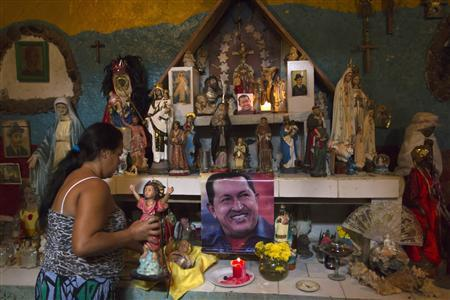Venezuelan Opposition Outraged As Supreme Court Upholds Delay Of Chavez Inauguration

The Venezuelan Supreme Court has ruled in favor of the legislature’s decision to postpone the Jan. 10 inauguration of President Hugo Chavez as he continues a difficult and tenuous recovery from recent cancer surgery in Cuba amid ongoing secrecy about the true status of his health.
If Chavez is unable to continue in office, new elections must be held within 30 days, according to the Venezuelan constitution, though it will be up to the Supreme Court to determine when he is officially absent from his post.
The political opposition is asking the Supreme Court to deem Chavez temporarily incapacitated if he is unable to take office on the date of his inauguration, but the government has argued that this does not apply to Chavez because he is an incumbent. Chavez was re-elected to a third six-year term last October and has been in office since 1999.
"Right now in Venezuela, without any doubt whatsoever, a constitutional conflict has arisen," opposition leader Henrique Capriles said, the BBC reported.
If Chavez is determined to be temporarily incapacitated, then power will transfer to the Speaker of the National Assembly Diosdado Cabello -- instead of Vice President Nicolas Maduro, Chavez's political heir.
The opposition is also arguing that Maduro, who was appointed by Chavez and not elected, will no longer be vice president as of Thursday.
The National Assembly, however, voted Tuesday to push back the date of the inauguration for an indeterminate period, while Maduro stands in for Chavez, which the Supreme Court upheld in a decision Wednesday.
"We know it's necessary, and undoubtedly the inauguration is going to be carried out, but at this time we can't anticipate when," Supreme Court President Luisa Estella Morales said during a press conference Wednesday, the Associated Press reported.
The Venezuelan also supported the delay, rejecting opposition concerns that any postponements would be tantamount to destabilizing the country, the Guardian reported.
Capriles even accused the government of violating Venezuela's constitution. "This isn't a monarchy and we aren't in Cuba," Capriles said at a press conference.
Meanwhile, Chavez remains in Cuba one month after his latest operation and has not given any public statements since then.
The government has released limited information about Chavez’s health, only revealing last week that he was suffering from complications of a lung infection. It remains unknown what type of cancer Chavez has and how severe his condition is.
The opposition had demanded more transparency surrounding Chavez’s health, while it tries to not publicly anticipate the very real possibility of new elections and risk a potential backlash from the state-controlled media for appearing to wish harm on the president.
© Copyright IBTimes 2025. All rights reserved.





















